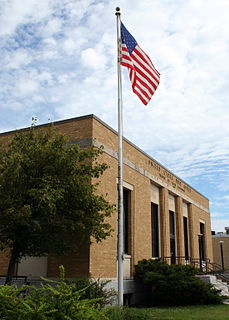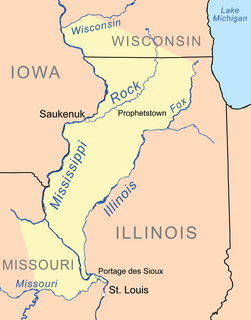
The Ojibwe, Ojibwa, Chippewa, or Saulteaux are an Anishinaabe people in what is currently southern Canada, the northern Midwestern United States, and Northern Plains.

Prairie du Chien is a city in and the county seat of Crawford County, Wisconsin, United States. The population was 5,605 at the 2020 census. Its ZIP Code is 53821.

The Potawatomi, also spelled Pottawatomi and Pottawatomie, are a Native American people of the western Great Lakes region, upper Mississippi River and Great Plains. They traditionally speak the Potawatomi language, a member of the Algonquin family. The Potawatomi call themselves Neshnabé, a cognate of the word Anishinaabe. The Potawatomi are part of a long-term alliance, called the Council of Three Fires, with the Ojibway and Odawa (Ottawa). In the Council of Three Fires, the Potawatomi are considered the "youngest brother" and are referred to in this context as Bodwéwadmi, a name that means "keepers of the fire" and refers to the council fire of three peoples.

The Territory of Michigan was an organized incorporated territory of the United States that existed from June 30, 1805, until January 26, 1837, when the final extent of the territory was admitted to the Union as the State of Michigan. Detroit was the territorial capital.
The Council of Three Fires is a long-standing Anishinaabe alliance of the Ojibwe, Odawa, and Potawatomi North American Native tribes.
Match-E-Be-Nash-She-Wish was a hereditary chief of a Potawatomi Indian group in what is now Michigan. The Potawatomi are one of the peoples of the Council of Three Fires; the others are the Odawa and the Ojibwe, all Algonquian-language speakers.
Billy Caldwell, baptized Thomas Caldwell, known also as Sauganash, was a British-Potawatomi fur trader who was commissioned captain in the Indian Department of Canada during the War of 1812. He moved to the United States in 1818 and settled there. In 1829 and 1833 he negotiated treaties on behalf of the United Nations of Chippewa, Ottawa and Potawatomi with the United States, and became a leader of a Potawatomi band at Trader's Point. He worked to gain the boundary long promised by the British between white settlers and Indians, but never achieved it.

The Treaty of Chicago may refer to either of two treaties made and signed in the settlement that became Chicago, Illinois between the United States and the Odaawaa, Ojibwe, and Bodéwadmi Native American peoples. The first was in 1821 and the second in 1833.
The Treaty of Fond du Lac may refer to either of two treaties made and signed in Duluth, Minnesota between the United States and the Ojibwe (Chippewa) Native American peoples.
Treaty of Prairie du Chien may refer to any of four treaties signed in Prairie du Chien, Wisconsin by the United States and Native American peoples of the Upper Midwest:

Shabbona, also known as Shabonee and Shaubena, was an Ottawa tribe member who became a chief within the Potawatomi tribe in Illinois during the 19th century.
A Tribal Political Organization is a political tribal council advocating the political interests of the First Nations and Tribes of their constituency. This list focuses on the TPOs to which the various Anishinaabe nations belong.
Treaty of St. Peters may be one of two treaties conducted between the United States and Native American peoples, conducted at the confluence of the Minnesota River with the Mississippi River, in what today is Mendota, Minnesota.

Prairie Band Potawatomi Nation is a federally recognized tribe of Neshnabé, headquartered near Mayetta, Kansas.

The Treaty of Prairie du Chien may refer to any of several treaties made and signed in Prairie du Chien, Wisconsin between the United States, representatives from the Sioux, Sac and Fox, Menominee, Ioway, Winnebago and the Anishinaabeg Native American peoples.

The Treaty of Prairie du Chien may refer to any of several treaties made and signed in Prairie du Chien, Wisconsin between the United States, representatives from the Sioux, Sac and Fox, Menominee, Ioway, Winnebago and the Anishinaabeg Native American peoples.

The Treaty of St. Louis is the name of a series of treaties signed between the United States and various Native American tribes from 1804 through 1824. The fourteen treaties were all signed in the St. Louis, Missouri area.
The Treaty of St. Louis is the name of a series of treaties signed between the United States and various Native American tribes from 1804 through 1824. The fourteen treaties were all signed in the St. Louis, Missouri area.

Alexander Robinson, was a British-Ottawa chief born on Mackinac Island who became a fur trader and ultimately settled near what later became Chicago. Multilingual in Odawa, Potawatomi, Ojibwa, English and French, Robinson also helped evacuate survivors of the Fort Dearborn Massacre in 1812. In 1816, Robinson was a translator for native peoples during the Treaty of St. Louis. He became a Potawatomi chief in 1829 and in that year and in 1833, he and fellow Metis Billy Caldwell negotiated treaties on behalf of the United Nations of Ottawa, Chippewa, and Potawatomi with the United States. Although Robinson helped lead Native Americans across the Mississippi River in 1835, unlike Caldwell, Robinson returned to the Chicago area by 1840 and lived as a respected citizen in western Cook County until his death decades later.











